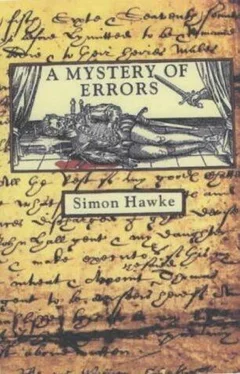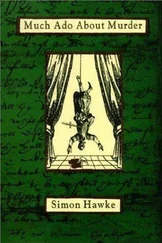Simon Hawke - A Mystery Of Errors
Здесь есть возможность читать онлайн «Simon Hawke - A Mystery Of Errors» весь текст электронной книги совершенно бесплатно (целиком полную версию без сокращений). В некоторых случаях можно слушать аудио, скачать через торрент в формате fb2 и присутствует краткое содержание. Жанр: Исторический детектив, на английском языке. Описание произведения, (предисловие) а так же отзывы посетителей доступны на портале библиотеки ЛибКат.
- Название:A Mystery Of Errors
- Автор:
- Жанр:
- Год:неизвестен
- ISBN:нет данных
- Рейтинг книги:3 / 5. Голосов: 1
-
Избранное:Добавить в избранное
- Отзывы:
-
Ваша оценка:
- 60
- 1
- 2
- 3
- 4
- 5
A Mystery Of Errors: краткое содержание, описание и аннотация
Предлагаем к чтению аннотацию, описание, краткое содержание или предисловие (зависит от того, что написал сам автор книги «A Mystery Of Errors»). Если вы не нашли необходимую информацию о книге — напишите в комментариях, мы постараемся отыскать её.
A Mystery Of Errors — читать онлайн бесплатно полную книгу (весь текст) целиком
Ниже представлен текст книги, разбитый по страницам. Система сохранения места последней прочитанной страницы, позволяет с удобством читать онлайн бесплатно книгу «A Mystery Of Errors», без необходимости каждый раз заново искать на чём Вы остановились. Поставьте закладку, и сможете в любой момент перейти на страницу, на которой закончили чтение.
Интервал:
Закладка:
The forge at the smithy on his estate was first rate, as could be expected, and more than large enough for any project. It did not receive much use and Sir William had said that he could help himself to it anytime he pleased.
“I shall hold you to that debt that you incurred. I want to see what you can do,” he had said. “And if your skill with forging steel is anywhere near that of your uncle, then you could have a brilliant future as a swordsmith and forget all about this acting nonsense.”
“But ‘tis what I yearn most of all to do, milord,” Smythe had replied.
“Well, then by all means, go and do it. Perhaps you will work it out of your system. But if you ask me, a life as a player is no fit occupation for man. Still, if acting is your dream, then you should certainly pursue it. Far be it from me to tell a man what he should or should not do, for as much as I have done that which I should, I have done even more that I should not, and have enjoyed the latter far more greatly than the former.”
“I thank you for your sentiment, milord, and for your hospitality. But I fear that I may no longer have a job when I return, for it is getting late and now I shall never make it back in time for the next performance.”
“Never fear,” Sir William said. “I am not without some influence, you know. I shall write out a message to James Burbage, the owner of the Theatre, that you were doing me a service at my bidding and should therefore be excused your absence. Your job shall be safe when you return.”
Smythe had thanked him and departed, feeling in a curious way that he had made a friend, and yet, he knew that true friends truly needed to be equal, and he could never be the equal of Sir William. And perhaps that was what he needed to remember most of all about his fascinating new acquaintance. He could be on equal terms with a brigand, but never with a knight.
As he entered London, his thoughts turned toward his roommate. He knew that Will had worked all night, trying to rewrite the play, and he hoped that he had been successful. But it had seemed to him a monumental task. Almost impossible. How could an entire play be thoroughly rewritten in one night? Burbage had been monstrously unfair in laying such a task on Shakespeare. But then again, Smythe remembered, Shakespeare had volunteered for it himself. It took nerve, but he had been desperate to show what he could do and he had struck when he saw his opportunity. The question was, had he struck too soon?
Another chance might have arisen later, but now, if he failed at this task, a second chance might never come. It was a risky wager and Shakespeare was betting all upon himself. It took considerable faith in one’s own abilities to gamble in this way, but Will had dutifully and purposefully applied himself to the rather daunting task.
Though the poet had tried hard not to disturb him, before he went to sleep, Smythe had heard him mumbling and muttering to himself as he sat hunched over at the table, holding his quill in a gloved hand. On occasion, Will had moaned over some clumsily rendered line, and once, he had straightened on his bench, arching his neck back and gazing at the ceiling, groaning from either muscles sorely tested or sorely tested wits. And he was still hunched over the table and working feverishly when Smythe had left for Green Oaks early in the morning, saying nothing so as not to disturb his concentration.
By now, he thought, all would have been decided, one way or another. It was late in the afternoon and drawing into evening. The performance had long since started and by the time Smythe reached their lodgings, it would have been nearly finished. Had Will managed to deliver the doctored play in time? And had there been time enough for the actors to prepare it, incorporating whatever changes he had made? Or else had Shakespeare failed in his task or, worse yet, finished only to learn that the result had been found wanting? Smythe knew that he would not have very long to wait before he would find out. The company would repair to the tavern downstairs immediately after the performance and he would meet them there.
In the meantime, he would shake the dust out of his clothes, and use the washbasin, and perhaps lie down for a short while to mull over the remarkable events of the day. But when he opened the door to their room, there was yet another remarkable event confronting him. The bed was occupied by a young woman.
Awakened by the creaking door and the weight of his tread upon the squeaky floorboards, she gasped and sat bolt upright in the bed, alarm clearly written on her features. But when she saw him, she seemed at once relieved.
“Oh! ‘Tis you, at last!”
For a moment, Smythe thought he had intruded upon a serving wench from the tavern who had been bedded by his roommate in celebration of the completion of his task, but then he saw that she was fully dressed and suddenly realized why she looked familiar. She was not one of the serving wenches from the tavern, but the young woman who had arrived at the Theatre in that coach… Anthony Gresham’s coach. He had made a point of remembering the name. She was not wearing the same elegant dress she had worn then, and had garbed herself most plainly, but he recognized her nonetheless. And she, apparently, remembered him. Indeed, it sounded as if she had come specifically to see him, which seemed even more remarkable.
“Milady?” Smythe said, taken aback. “Forgive me my impertinence, but am I to understand you have been waiting for me?”
“Oh, for hours!” she said, in exasperation, swinging her legs down to the floor. Smythe caught a tantalizing glimpse of bare calves and ankles nearly to the knee and discreetly looked away. “I had begun to think that you would never come!”
“But… how did you get in here?”
“Your friend, Master Shakespeare, let me in. He told me you would soon return and that if I cared to wait, then I should make myself at home.”
“Master Shakespeare, is it? Well, we shall see. But I must admit that I am mystified, milady. To what do I owe this unexpected pleasure?”
She smiled, and seemed to look a bit more calm. “You are very well spoken for an ostler.”
“I always try to be well spoken to beautiful women I find lying in my bed,” he replied.
She chuckled. “You are impertinent, but I do believe it suits you. Your name is Smythe, if I recall aright. Symington Smythe. Is that not so?”
“It is, milady. But friends such as Master Shakespeare call me Tuck.”
“Tuck,” she repeated, as if trying it on him for size. “I like it. It suits you, too. I am Elizabeth Darcie.”
“How do you do, Mistress Darcie?” he bowed slightly from the waist. “You must have come here on an urgent errand, indeed, to risk your reputation upon an unchaperoned visit to an ostler’s lodgings. Perhaps, all things considered, it would be better if we spoke downstairs, in the tavern?”
She waved him off. “I have slept up here for hours,” she said. “If there is any damage to be done to my reputation, then ‘tis already done and doubtless past repair. What is more, I do not care about that in the least. I have a pressing concern that is far greater.”
“Perhaps you should care,” Smythe replied. “However, be that as it may, I am at your service.” He pulled the bench over and sat down.
“I had hoped you would be,” she replied. “You have a kind and honest face. And right now, I need a kindness from you, and some honesty.”
“If it lies at all within my capability, milady, then consider it done,” he said.
She smiled. “Thank you. You are very gallant. What I need from you should not greatly tax your efforts, nor inconvenience you to any great degree. At least, that is my hope. Allow me to explain…”
Читать дальшеИнтервал:
Закладка:
Похожие книги на «A Mystery Of Errors»
Представляем Вашему вниманию похожие книги на «A Mystery Of Errors» списком для выбора. Мы отобрали схожую по названию и смыслу литературу в надежде предоставить читателям больше вариантов отыскать новые, интересные, ещё непрочитанные произведения.
Обсуждение, отзывы о книге «A Mystery Of Errors» и просто собственные мнения читателей. Оставьте ваши комментарии, напишите, что Вы думаете о произведении, его смысле или главных героях. Укажите что конкретно понравилось, а что нет, и почему Вы так считаете.












